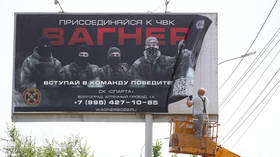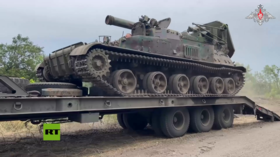Wagner does not legally exist, Putin tells media

Russian law does not recognize the existence of private military companies, including Wagner, President Vladimir Putin told the newspaper Kommersant on Thursday, when asked about his recent meeting with commanders of the mutinous group.
While attending a technology fair in Moscow, Putin was asked whether Wagner will continue operating as a combat formation.
“Well, PMC Wagner does not exist,” Putin told the Kommersant correspondent. “We don’t have a law on private military companies. So it simply doesn’t exist.”
“The group exists, but legally it does not,” the president clarified. “It’s a separate issue, related to legalization, that needs to be taken up by the State Duma and the government. A complicated question.”
The Russian government has long held this position when asked about the group, nominally headed by businessman Evgeny Prigozhin. Wagner’s de facto existence was only acknowledged by the Russian military when the group became involved in the fighting in Donbass last year, in particular at Popasnaya and Artyomovsk, also known as Bakhmut.
Earlier this week, Kremlin spokesman Dmitry Peskov confirmed a report by a French outlet that Putin had met with 35 members of Wagner on June 29, several days after the group engaged in an armed rebellion. On Thursday, Putin was asked to give his version of what happened.
“I don’t have a version,” the Russian president replied. “You or NATO may have a version. I have what actually happened.”
According to Putin, he wanted to meet with Wagner commanders who had fought honorably, more than with Prigozhin, though he was present as well.
“At the meeting I gave an assessment of what they did on the battlefield, and what they did during the events of June 24,” Putin said. “Third, I showed them the possible variants of how they could continue their service, including in combat. That is all.”
At one point, Putin said, he offered the men gathered at the Kremlin to continue their military service under the same commander they had served with for the past 16 months, known by his call sign ‘Grayhair’. While many of them nodded, Prigozhin spoke up on their behalf and said they did not agree.
After laying siege to the military headquarters in Rostov and sending a convoy of vehicles towards Moscow, Prigozhin ordered Wagner to stand down on June 24, after Belarusian President Alexander Lukashenko mediated a deal with the Kremlin. Under the terms of the deal, Wagner would be reintegrated into the Russian armed forces, while Prigozhin would move to Belarus and the criminal case against him for armed mutiny would be dropped.













